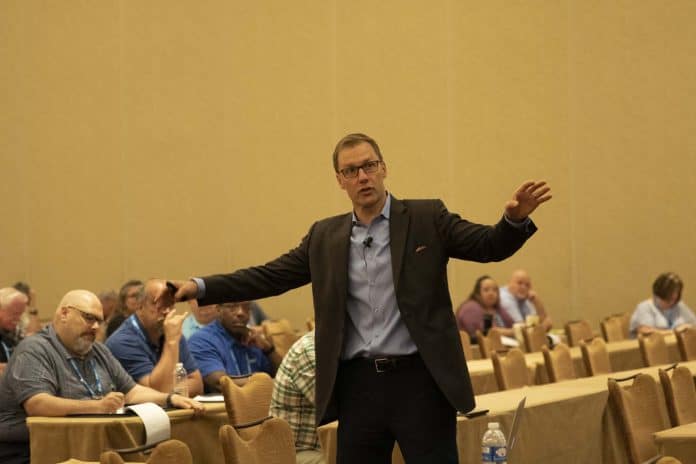Trust is a fragile thing. It takes years of experience and diligent work to build, yet only a moment of disappointment to destroy. On its face, trust is not about how likable or despicable you are, though people who are trusted tend to also be well-liked.
So, what makes people trust in one person or thing over another?
According to The Trust Edge Leadership Institute, founded by this summer’s STN EXPO Reno keynote and Transportation Director Summit trainer David Horsager, the underlying question for 2020 is “Can I trust you?” The way you answer that will either make or break your school bus organization, business or consulting firm.
It probably sounds like I’m beating a dead horse, but guess what Trust Edge research has found to be the No. 1 concern among organizational leaders? That’s right, their people and culture.
Trust Edge said that focusing on constructing a high- trust culture leads to empowering capable, confident, consistent and compassionate employees, not to mention productive ones. The opposite low-trust culture breeds employees who operate amid unclear expectations.
They respond by performing their work slower out of fear or micromanagement. Hence, they are inconsistent and inefficient, and they perform work with their own interests in mind, rather than the organization’s.
Which employees do you want driving your students, especially the most fragile ones who have disabilities?
Meanwhile, it shouldn’t come as a big surprise to learn that people also tend to retain the trust they formed in childhood through lived experiences and cultural heritage, according to Cary Wu, a sociology professor at New York University. While Wu’s research, which was recently published in The Sociological Quarterly, centers on migratory patterns of Americans and the resulting effect on their trust levels, several extrapolations could be made about perceptions parents have about student transportation.
The experiences that parents had on their school bus 20, 30 or 40 years ago, shaped the perceptions and beliefs, no matter how unfounded, that they hold dear today. They perhaps remember a time before the Individuals with Disabilities Education Act, or at least when the federal law was still in its infancy, when many of the protections that are available to today’s students, weren’t available or weren’t at the current maturity level.
Today’s parents remember a time before the current widespread usage of child safety restraint systems, before there was an accelerated acceptance rate of seatbelts, compared to today. Some parents likely still associate school bus driver personas with curmudgeonly depictions in the movies, or the school bus ride with their own harrowing experiences at the hands of bullies.
Despite the unparalleled safety record of school buses, or perhaps in spite of it, student transporters must remain at the top of their game, day in and day out, to continue fostering trust with parents and students alike. And that is an exhausting exercise.
Add that to a changing landscape of what student transportation looks like, with the emergence of new alternatives to the yellow bus that relate more to the sensibilities of today’s app-connected parents, for example.
This month, some 500 attendees (along with representatives of 75 exhibiting companies) are expected to descend on Frisco, Texas outside of Dallas, as they strive to become better transporters to and advocates for students with special needs and preschoolers.
As much as the TSD Conference is about special needs training, it is just as much about building trust. Trust in processes and procedures. Trust through communication, Trust in each to do the right thing for the students, and to follow through on commitments.
More so, events like the TSD Conference are designed to make the industry more trustworthy in the eyes of the general public, especially parents.
There are many moving parts to student transportation. Industry professionals must continuously strive to learn a new, better way to move children from home to school, to therapy sessions, to extracurricular activities and back again. Now is not a time for resting on laurels or safety statistics.
As the business term coined by Craig Charles goes, “Evolve or Die.” Stagnancy is the surest way to breed mistrust and destroy much of what the industry has worked so hard to attain.
Editor’s Note: As reprinted from the March issue of School Transportation News.
















